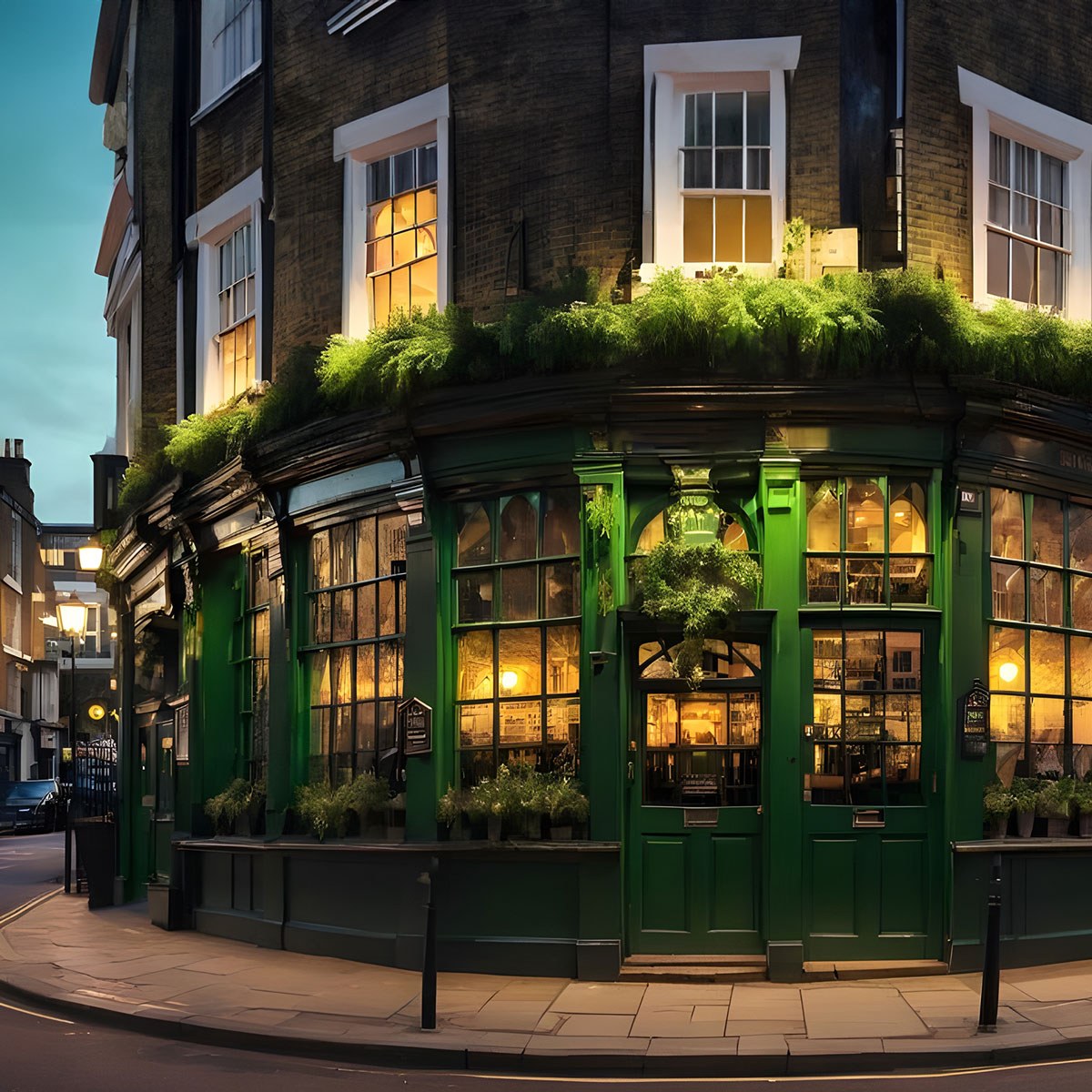
2 Oct 2025

The great British pub is a cornerstone of British culture.
Tourists and curious pub enthusiasts travel from across the globe to visit world famous ‘pubs and landmarks marked by pubs, around the UK.
Celebrities invest in them, friends and families congregate in them, we celebrate and commiserate in them. And, we all have a first memory of our visit to a pub.
Maybe it was a Sunday roast with family, a pub quiz with friends, karaoke night for your aunt’s 40th, working your first job, or your first pint on your 18th birthday. The pub is the home of memories for so many of us.
And it’s become more than just a cultural zeitgeist. It’s a solace from the day-to-day slog of reality for many Brits.
The dogs, the kids, the grandparents, the in-laws – now-a-days, everyone is welcome.
And it’s quite often you’ll hear a pub name used as a reference to define locations and meeting points... “Meet me by the Queen’s head.” “I live a few doors up from the White Hart.” Quite a few pubs are on par with British monuments when it comes to attracting visitors from afar.
The great British pub can facilitate a sense of community and family, providing a space for connection and memory-building; they’re known, even globally, as a hallmark of the UK.
A brief history of the Great British Pub
Almost every pub in the nation tells an epic story or two within its walls, each building frequently adorning unique quirks and oddities, rich with local history.
But where did it all begin?
Pubs are typically associated with beers and ales, but they began as wine bars - and we have the Roman army to thank for bringing them to our country.
Known as ‘tabernae’, these wine shops popped up along Roman roads to quench the thirst of local soldiers.
Ale, being the native drink of the UK, was later introduced to the tabernae which meant they then saw a spike in popularity; the name for the establishment evolved into ‘tavern’ soon after.
Other names for these venues included ‘inn’, which also provided lodgings for travellers, and ‘alehouse’, which were typically members-only establishments.
‘Inn’ became synonymous with ‘public house’, which saw the growing acceptance of the “pub” in our town and villages meant that they became the focal point for communities and their social gatherings. And with that brings the good and the bad.
Almost every historic pub in London claims a connection with Charles Dickens, but not many can shout about William Shakespeare being a local, like the George Inn. Apparently, he was a regular who propped up the bar here and his plays were performed in the courtyard (the galleries remain intact to this day).
When we consider just how many relationships, friendships, business ventures and ideas that are formed in the local pub, it really reinforces the communal nature of the Great British Pub, and its ability to bring groups together.
But a pub is not just your working-class social hub. There are now globally renowned landlords and landladies that include Sir Ian McKellan, Ed Sheeran, David Beckham, Jodie Kidd, and Guy Ritchie.
Quirks of the Great British pub
There are many quirks that you can experience when it comes to the great British pub that you don’t normally find to be the same in bars around the world.
The UK is well-known for having peculiar names for things, but some pub names are true head-scratchers.
Why is this?
In the late Middle Ages, most of the UK population were illiterate. Pubs used symbols and images as pub signs to make it easier for customers to identify them; therefore, bizarre names like The Bucket of Blood or The Cat and Custard were easier to depict.
During the Middle Ages, pub owners would also hang distinctive objects outside their door to differentiate themselves from other buildings; these objects would then often influence the name of the establishment. Think: The Boot.
As a traditionally patriotic nation, a lot of British pub names take royal inspiration; for example, there are 299 pubs in the UK named The White Hart, all named after King Richard III’s personal badge from back in the 1300s.
The names of many pubs in the UK were also inspired by the local trade of that region; any guesses as to what the local trade was nearby The Pyrotechnists’ Arms?
How have pubs changed?
British pubs have come a long way from being dimly lit, dusty “boozers” filled with only men drinking bitters; these days, we can enjoy a much more diverse and inclusive pub setting.
Though there is an unmistakable lifestyle shift taking place in the UK resulting in a steady rate of pubs sadly closing their doors, by the end of 2023, 45,200 pubs still stand strong in the nation.
Large chains are prominent across the industry, and rightly so. They are innovating the pub in ways we haven’t seen before.
But, the number of community-owned pubs has risen by 62.6% in the last five years. A new and interesting concept, community-owned pubs are run by a local group who have joint ownership of the premises, all with an equal say in how the business is run. So, it’s safe to say there is still room for a good old British Pub in the heart of the British community.
Chain pubs, though each branch may be slightly different, all share the similar values and aesthetic, but they are doing a great job at keeping our pubs thriving and accessible.
Community owned pubs, on the other hand, such as The Old Forge in the West Highlands of Scotland, (which takes a two day Highlands walk to get to, as one of the UK’s most remote pubs!) can champion authentic, traditional culture and diversity, potentially capturing the attention of the nation.
Other things are happening on the pub scene which are innovative and exciting. If you live in, or visit the UK, you’re likely not too far from a ‘microbrewery’ situated inside a pub. This may include extra bonuses like craft beers and quirky gastro menus.
Many pubs are now known to sell gourmet food, or be fronted by a celebrity chef - think, The Hand and Flowers in Marlow which is run by the enigmatic chef, Tom Kerridge.
The landscape is really changing to embrace and include a wider variety of pubs with their own identities. From larger chains to back street ‘boozers’, to our beloved high street go-tos. Each is adding to the fabric of the Great British pub landscape, and we are excited about everything they bring to the industry. There really is something for everyone.
The real question is, what do YOU think of when you think of the pub?
What’s in store for Great British pubs?
Events such as the pandemic and the cost-of-living crisis have resulted in more people staying in and cutting out “frivolous” spending. A recent study by Deloitte showed that the desire to go out and drink in pubs has declined by 6% in Brits. (Who are these 6%, we ask…?)
Given the potential extended smoking ban that is currently under consideration, this could also weigh in on the change of tides for British pubs.
Though there are many more challenges around that may cause some pubs to close their doors, many will be embracing the change and adapting to a new lifestyle.
We could say that some British pubs have become more renowned for their cuisine than their drinks, cigarettes and beers, with many frequenting pubs for a delicious three course meal, as opposed to a standalone restaurant.
Pubs that lean into a “split-personality” vibe, (perhaps presenting as a coffee shop during the day, incorporating live music, comedy nights or other special events during the week, or opening their doors to community-led events on quieter evenings) are much better prepared to adapt to the next change in the UK’s lifestyle.
Pubs will also likely see a benefit in becoming more family friendly; many of us will have fond memories of going to the pub with parents as kids and will be passing this nostalgic batten down to our children.
The truth is: no matter how much the lifestyle in Britain changes, pubs and other hospitality businesses can always count on the human desire to eat, drink, and socialise. We should absolutely take our hats off to our landlords and ladies, patrons, entertainers, workers, and supply chain of the humble British pub.
The Great British Pub attracts tourists from around the globe to experience a pint, boosting the local economy as well as our own communities. They are the hub for sports, family gatherings, and many great memories.
So, big cheers to our beloved watering hole - this one is on the house!
~~
At Classeq, we are passionate about the growth and success of the hospitality sector. That’s why we are committed to providing you with content that explores every juncture of the hospitality journey from the distribution of catering equipment right through to the patron’s plate.
If there is a topic you’d like us to explore further, do let us know. Otherwise, view our full content library here, or speak to a member of the team today . Whether it’s a new machine you need, or technical support, our team is ready to assist.
You have questions or need help?
We'll call you or write to you!